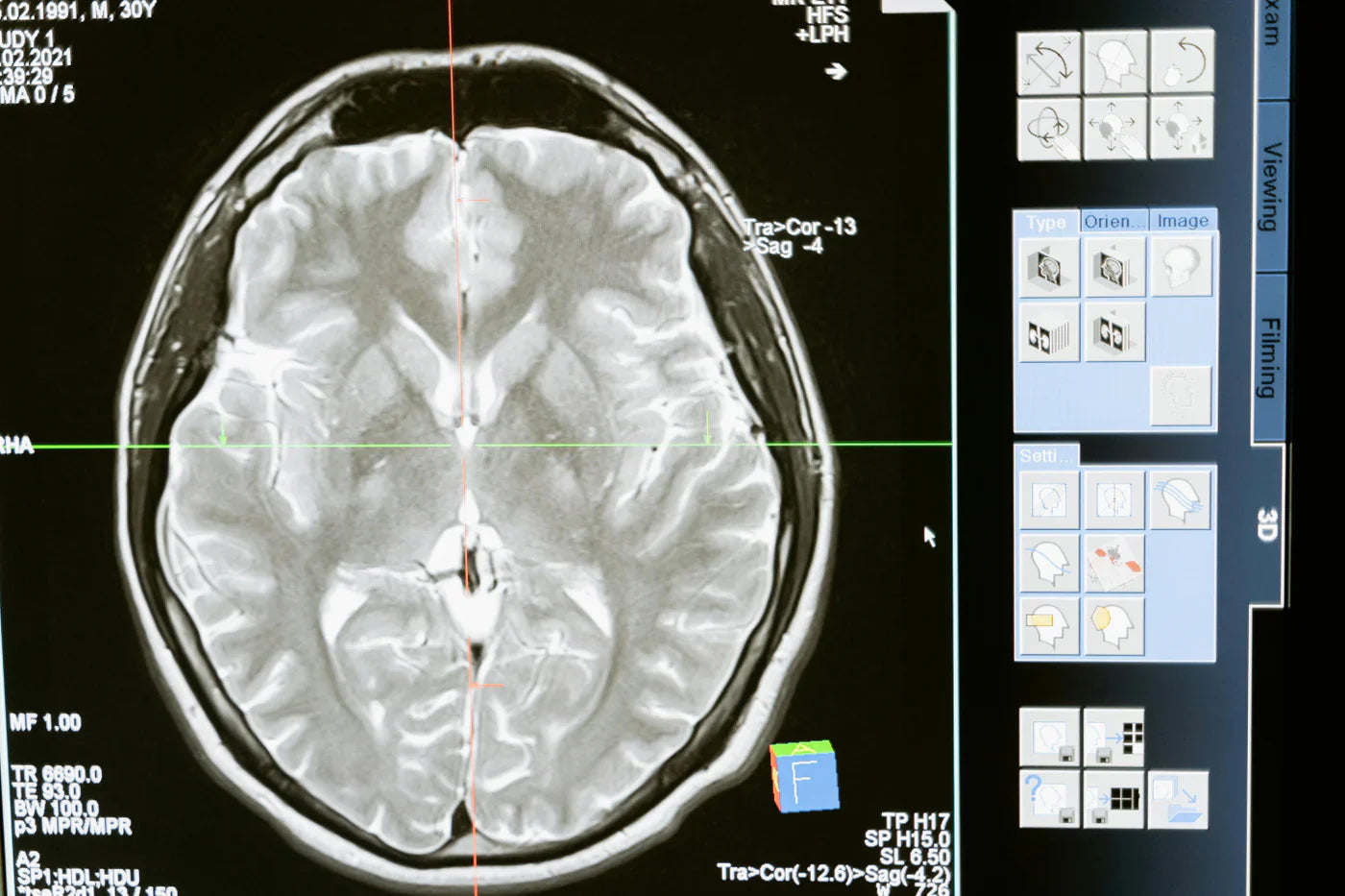Article: Women with severe PMS and PMDD experience depression-like symptoms every month

Women with severe PMS and PMDD experience depression-like symptoms every month
The brain scans shown above are simplified, and compare the general characteristics of a brain with depressive symptoms to a healthy brain when performing a cognitive task. These scans do not represent the brains or women with PMS or PMDD. We discuss clinical research about changes in women’s brains during their cycles with this image to emphasise the stark difference seen in the brains of women during various phases of their cycles that, in the luteal phase, resemble the brains of those with depression more closely than those of healthy controls. This is also indicative of how little neuro-imaging evidence there is in women’s health.
It's All in Your Brain
An increasing number of clinical studies are examining the brain in relation to the menstrual cycle, with a particular focus on women with severe PMS symptoms or Premenstrual Dysphoric Disorder (PMDD). By using brain scans, researchers have identified drastic changes in brain activity during the luteal phase (the 5-10 days leading up to your period) compared to the rest of the cycle. These changes are often so drastic that they exhibit patterns of activity similar to those observed in individuals suffering from depression. This important research establishes a vital link between menstrual cycles, mental health, and the lived experiences of millions of women.
Let's explore this science in more detail.
Hormones Impact Everything
We often think about how hormones impact our bodies, but seldom consider their effects on our brain. Fluctuations in estrogen and progesterone levels during the menstrual cycle significantly influence brain functions and mood.
Indeed, Estrogen plays a pivotal role in modulating brain function. It's involved in controlling the growth, survival, and activity of neurons. Regarding mood, estrogen’s impact on serotonin, is paramount. It enhances serotonin's production and receptor sensitivity, leading to us feeling good mentally. That's why in the follicular phase, as estrogen levels rise, women often feel invincible, experiencing a boost in mood and cognitive abilities.
Progesterone, on the other hand, can have a sedative and depressive effect. It peaks during the luteal phase (5-10 days before your period) and influences the production of neurotransmitters like GABA, promoting relaxation but also contributing to mood swings and irritability.
The Dreaded Luteal Phase
During the luteal phase, the surge in progesterone and fluctuating estrogen levels lead to significant changes in brain activity and mood.
A study by Li et al. (2021), revealed that hormonal changes are not just statistical data points but have tangible effects on brain function and, by extension, mood and cognition. The prefrontal cortex, a brain region pivotal for emotional regulation and cognitive processing, becomes less responsive to emotional stimuli during this phase. For women with PMDD, this reduction is pronounced, mirroring patterns observed in depression.
To add to that, the luteal phase also triggers distinct changes in brain wave activity. Baehr et al. (2004) found that alpha waves, which are instrumental in mood regulation, exhibit notable imbalance or asymmetry during this phase. This isn’t a harmless physiological shift. For women, particularly those with PMDD, this alpha wave asymmetry correlates with increased emotional sensitivity, mood swings, and episodes of depression.
In essence, the luteal phase isn’t just a period of hormonal change but a phase where the very foundations of emotional and cognitive well-being are shaken up and recalibrated. Millions of women go through these drastic changes every single month, with little to no validation for their suffering.
The Correlation with Depression - it's Real
Due to some of the phenomena described above, women suffering from severe PMS and PMDD experience depression-like symptoms every month. Let's take a look at the clinical study below, which visually illustrates how real these changes in the brain are:
In this study*, the mood of five women with PMDD was tracked over two of their menstrual cycles. The results showed that outside of their PMDD-affected luteal phase (the time leading up to their period), their mood scores were significantly higher and indicated no depression. However, during their PMDD-luteal phase, their mood scores dropped dramatically, well below the threshold that is considered to be depressive (58% PCT). This suggests that these women experienced depressive symptoms specifically during the phase before their period.
*E Baehr, et al., Int J Psychophysiol. (2004)
Put an End to the Monthly Imbalance
Navigating through these sharp and drastic changes in our brains is really challenging, for some it can even be debilitating. What's worse is that women who suffer from severe PMS or PMDD are often not taken seriously and do not receive care or validation for their suffering.
Many women we've spoken to feel like they've tried everything, from traditional treatments like medication and lifestyle changes, to hormonal therapies and antidepressants. Yet, the results are often mixed, inconsistent, and sometimes ineffective. While some find temporary relief, the side effects and temporary nature of this relief can be discouraging.
That’s why we’ve spent the past two years developing a medical-grade solution that offers real, uncompromised results: Menstrual Neuromodulation Therapy (MNT). MNT works by directly targeting the parts of the brain that are responsible for mood regulation and generation. It offers an advanced, clinically tested approach to rebalance the brain fluctuations experienced during the menstrual cycle. With MNT, women can feel their best throughout their cycle.
